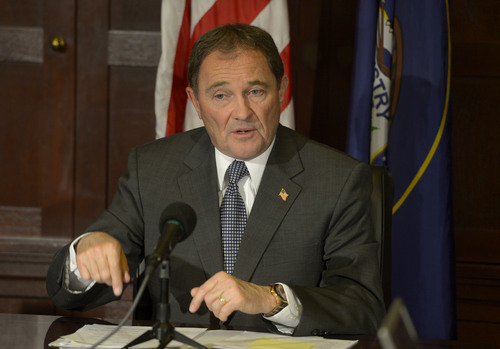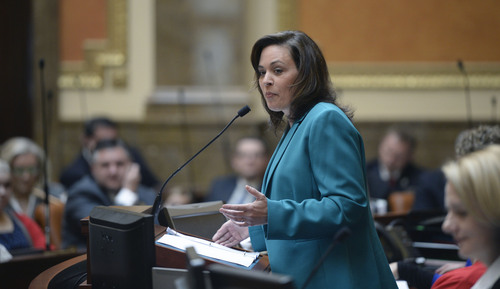This is an archived article that was published on sltrib.com in 2014, and information in the article may be outdated. It is provided only for personal research purposes and may not be reprinted.
Utah legislators will not come back into session this summer to override three vetoes issued by Gov. Gary Herbert, including one arising from the investigation of former Attorney General John Swallow, agreeing the issues can be addressed later.
Support in both the House and Senate fell well short of the two-thirds majorities that would be needed to override Herbert's vetoes — with 34 representatives and only eight senators supporting reversing the governor.
It would take 50 House members and 20 senators to convene such a session, at which point the legislative leaders would have decided which of the three vetoed bills to put on the agenda.
"We disagree with the governor on some of his final policy choices, but respect the checks and balances of our constitutional process," Senate President Wayne Niederhauser, R-Sandy, said in a statement. "We also appreciate the deliberative manner in which Governor Herbert carried out his responsibility. … For this reason, senators have opted to forgo the time and expense of an override session. We can address the few remaining policy disagreements at a later date."
House Speaker Becky Lockhart, R-Provo, said representatives believed the issues could be handled during the next session, which will be in January 2015.
There is also discussion that the Legislature may be back in a special session this summer. There has been at least one special session in each of the past 13 years.
"We appreciate that the governor evaluated and agreed with 99.5 percent of the legislation we passed this year," Lockhart said in a statement.
Most notably, Herbert vetoed a bill that would have given a panel of parents at the state school board level the authority to hear complaints about school curriculum. The parents did not want the responsibility, suggesting it should be handled at the local level, and the state school board and PTA urged the governor to veto the bill.
Herbert also vetoed a bill arising from the Swallow investigation that would have given legislative committees wider authority to subpoena information during legislative probes.
The governor said HB414 went too far, warning the bill would "violate civil rights and is an overreach." Herbert said the bill would prevent people from challenging legislative subpoenas in court.
The bill's sponsor, Rep. Jim Dunnigan, R-Taylorsville, who headed the committee that conducted the Swallow investigation, disagreed, but said the differences could be worked out later and did not see great urgency in overriding the governor's veto.
Lockhart said that the Legislature still has the authority to issue subpoenas. It could come back later and clarify the process and the bounds for the requests.
During the course of the Swallow probe, the committee issued subpoenas to Swallow political consultant Jason Powers — along with his company and political committees he ran — and another to a payday-lending chain. Both went to court to challenge the legislative authority and, because Swallow resigned before the court ruled on the Legislature's demands, never had to turn over any records.
The governor also vetoed HB102, which would have put a one-year moratorium on the creation of new "assessment areas" by local governments. Herbert said it would have blocked several natural-gas projects that rural cities had in the works. Additionally, Herbert used his line-item veto authority to delete a redundant appropriation in a budget bill.
Twitter: @RobertGehrke





